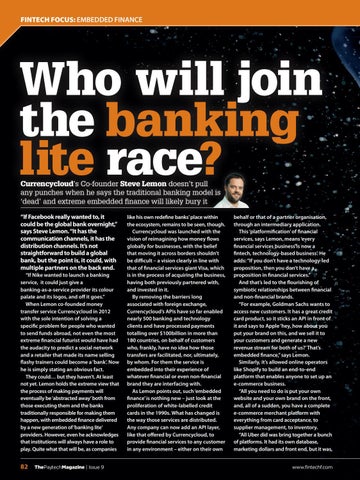FINTECH FOCUS: EMBEDDED FINANCE
Who will join the banking lite race? Currencycloud’s Co-founder Steve Lemon doesn’t pull any punches when he says the traditional banking model is ‘dead’ and extreme embedded finance will likely bury it “If Facebook really wanted to, it could be the global bank overnight,” says Steve Lemon. “It has the communication channels, it has the distribution channels. It’s not straightforward to build a global bank, but the point is, it could, with multiple partners on the back end. “If Nike wanted to launch a banking service, it could just give a banking-as-a-service provider its colour palate and its logos, and off it goes.” When Lemon co-founded money transfer service Currencycloud in 2012 with the sole intention of solving a specific problem for people who wanted to send funds abroad, not even the most extreme financial futurist would have had the audacity to predict a social network and a retailer that made its name selling flashy trainers could become a ‘bank’. Now he is simply stating an obvious fact. They could… but they haven’t. At least not yet. Lemon holds the extreme view that the process of making payments will eventually be ‘abstracted away’ both from those executing them and the banks traditionally responsible for making them happen, with embedded finance delivered by a new generation of ‘banking lite’ providers. However, even he acknowledges that institutions will always have a role to play. Quite what that will be, as companies
82
ThePaytechMagazine | Issue 9
like his own redefine banks’ place within the ecosystem, remains to be seen, though. Currencycloud was launched with the vision of reimagining how money flows globally for businesses, with the belief that moving it across borders shouldn’t be difficult – a vision clearly in line with that of financial services giant Visa, which is in the process of acquiring the business, having both previously partnered with, and invested in it. By removing the barriers long associated with foreign exchange, Currencycloud’s APIs have so far enabled nearly 500 banking and technology clients and have processed payments totalling over $100billion in more than 180 countries, on behalf of customers who, frankly, have no idea how those transfers are facilitated, nor, ultimately, by whom. For them the service is embedded into their experience of whatever financial or even non-financial brand they are interfacing with. As Lemon points out, such ‘embedded finance’ is nothing new – just look at the proliferation of white-labelled credit cards in the 1990s. What has changed is the way those services are distributed. Any company can now add an API layer, like that offered by Currencycloud, to provide financial services to any customer in any environment – either on their own
behalf or that of a partner organisation, through an intermediary application. This ‘platformification’ of financial services, says Lemon, means ‘every financial services business is now a fintech, technology-based business’. He adds: “If you don’t have a technology-led proposition, then you don’t have a proposition in financial services.” And that’s led to the flourishing of symbiotic relationships between financial and non-financial brands. “For example, Goldman Sachs wants to access new customers. It has a great credit card product, so it sticks an API in front of it and says to Apple ‘hey, how about you put your brand on this, and we sell it to your customers and generate a new revenue stream for both of us?’ That’s embedded finance,” says Lemon. Similarly, it’s allowed online operators like Shopify to build an end-to-end platform that enables anyone to set up an e-commerce business. “All you need to do is put your own website and your own brand on the front, and, all of a sudden, you have a complete e-commerce merchant platform with everything from card acceptance, to supplier management, to inventory. “All Uber did was bring together a bunch of platforms. It had its own database, marketing dollars and front end, but it was, www.fintechf.com
